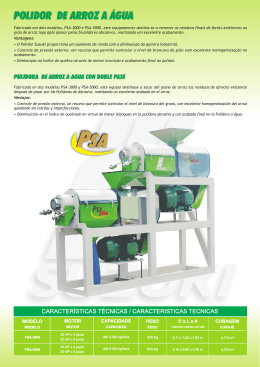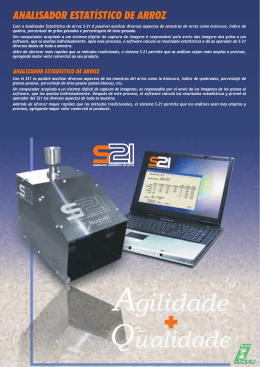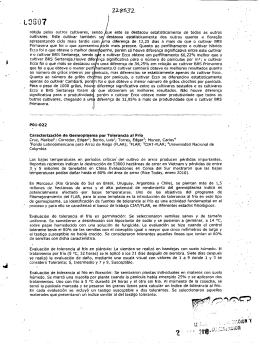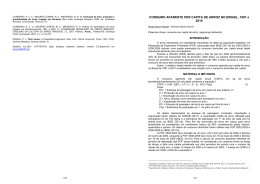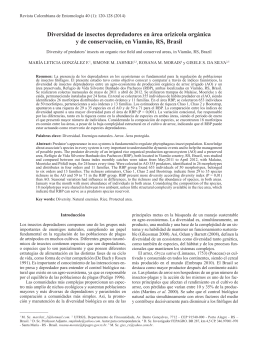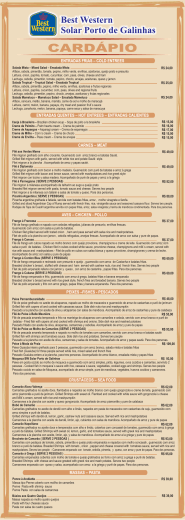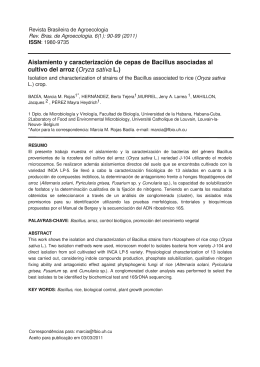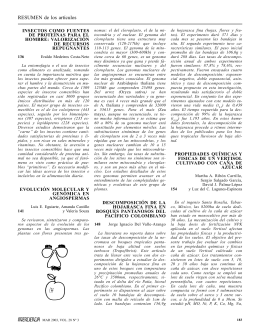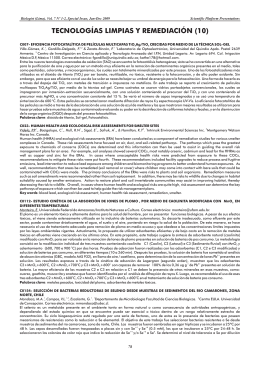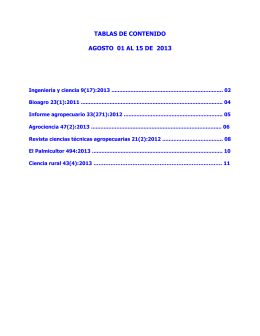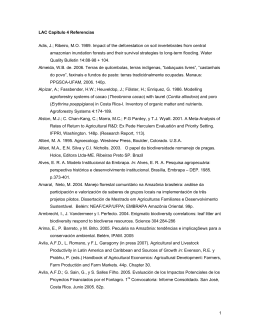141
8. BIBLIOGRAFÍA
1. ABUD, J. K. 1983. Efeito de herbicidas pre-emergentes en dois sistemas de semeadura
do arroz irrigado. In Reuniao da Cultura do Arroz Irrigado. (12ª , 1983, Porto Alegre).
IRGA. 274 p.
2. AICHELE, T.M.; PENDER, D. 2005. Adsorption, desorption, and degradation of
imidazolinones in soil. Weed Technology. 19, pp 154-159
3. AMARAL, A. S.; CARDOSO, E. S. 1983. Efeitos de herbicidas na emergencia de
plántulas de cultivares de arroz. Lavoura Arrozeira. Porto Alegre. 36 (345): pp 7-12
4. AMBROSI, D.; HELLING, C.S.1977. Leaching of oxadiazón and Phosalone in Soils. .
J. Agric. Food Chem. 25, (1) pp215-217
5. ____________.; KEARNEY, P.C.; MACCHIA, J.A. 1977. Persistence and metabolism of
oxadiazon in Soils. J. Agric. Food Chem. 25, (4) pp868-872
6. ANDERSON, W.P. 1996.Weed Science. Principles and Applications. Third Edition.
New Mexico, Las Cruces. 388 pp
7. ANDREA, M. M.; PERES, T. B.; LUCHINI, L. C.; BAZARIN, S.; PAPINI, S.;
MATALLO, M. B.; SAVOY, V. L. T. 2003. Influence of repeated aplications of
gliphosate on its persistente and soil bioactivity. Pesqusa Agropecuaria Brasileira. 38
(11): pp 1329-1335.
8. ANDRES, A.; MACHADO, J. L. O. 2004. Plantas dañinas em arroz irrigado. In Arroz
irrigado no sul de Brasil. Da Silva, A.; Magallanes A. ed. Brasilia, Df. Embrapa. pp 457546.
9. ARMBRUST, K.L. 1999. Photochemical processes influencing pesticide degradation in
rice paddies. Journal Pesticide Science. 24, pp 69-73
10. AVILA, L. A., LEE, D. J., SENSEMAN, S. A., McCAULLEY, G. N., CHANDLER, J.
M., AND COTHREN, J. T. 2005. Assessment of acetolactate synthase (ALS) tolerance
to Imazethapyr in red rice ecotypes (Oryza sativa spp) and Imidazolinone
tolerant/resistant rice (Oryza sativa) varieties. Pest Management Science. 61: pp 171178.
11. BARRETT, M.R.; LAVY, T.L. 1984. Effects of soil water content on oxadiazon
dissipation. Weed Science. 32, pp 697-701
142
12. CALVET, R. 1980. Adsorption-Desorption phenomena. In Interaction between
herbicides and the soil. R.J. Hance ed. . London. Academic Press. pp 1-30
13. CARRINGER, R.D.; WEBER, J.B; MONACO,T.J. 1975. Adsorption-Desorption of
selected pesticides by organic matter and montmorillonite. J. Agric. Food Chem. 23, (3)
pp 568-572
14. CHEBATAROFF, N. 1999. Arroz rojo, importancia y control. Arroz año V. 19, IV
época: pp 40-44.
15. CHUNG, N.J., PAEK, N. C. 2003. SEED, Photoblastim and Ecophysiology of seed
Germination in Weedy Rice. Agronomy Journal volume 95: pp 184-190.
16. CORNISH, P. S. 1992. Glyphosate residues in a sandy soil affect tomato transplants.
Australian Journal of Experiment Agriculture. Vol. 32: p 395-399.
17. CROUGHAN, T. 1998. In Seminario Latino Americano Sobre Arroz Vermelho (1º
2001, Porto Alegre). IRGA. 65 p.
18. DAS, A.C.; DEBNATH, A.; MUKHERJEE, D. 2003. Effect of the herbicides oxadiazón
and oxyfluorfen on phosphates solubilizing microorganisms and their persistence in rice
fields. Chemosphere 53, pp217-221.
19. DESCHAMPS, F. C.; NOLDIN, J. A.; EBERHARDT, D. S.; HERMES, L. C.;
KNOBLAUCH, R. 2003. Resíduos de agroquímicos en agues nas areas de arroz
irrigado, em Santa Catarina. In Reuniao da Cultura do arroz Irrigado. (25ª, 2003,
Camboriú, Santa Catarina) Anais. EPAGRI. pp 683-685.
20. DIARRA, A., SMITH, R. Jr., TALBERT, R.E. 1985a. Interference of red rice (Oryza
sativa) with rice. Weed Science 1985. Volume 33: pp 644-649.
21. __________, SMITH, R. Jr., TALBERT, R. 1985b. Growth and Morphological
Characteristics of Red Rice (Oryza sativa) Biotypes. Weed Science 1985. Volume 33:
pp 310-314.
22. DILDAY, R. H., MGONJA, M. A., AMONSILPA, S. A., COLLINS F. C., WELLS
B.R., 1990. Plant Height vs. Coleoptile elongation in Rice: Linkage or Pleiotropism?.
Crop Science 1990. Volume 30: pp 815-818.
23. DUKE, S. O.; LYDON, J.; BECERRIL, J.; SHERMAN, T. D.; LEHNEN, L. P. Jr.;
MATSUMOTO, H. 1991. Protoporphyrinogen Oxidase-Inhibiting Herbicides. Weed
Science. Vol. 39: 465-473.
143
24. EL-KHADEM, M.; NAGIB, M.M; TEWFIK, M.S. 1973. The effect of certain nitroherbicides on the growth of some soil inhabiting-fungi. Zentralblatt fur Bacteriologie,
Parasitenkunde Infektionskrankheiten und Hygiene,II. 128, (7/8) pp780-786
25. FERRERO, A.; VIDOTTO, F.; BALSARI, P.; AIROLDI, G. 1999. Mechanical and
chemical control of red rice (Oryza sativa L. var. sylvatica) in rice (Oryza sativa L.) preplanting. Crop Protection. Vol. 18: pp 245-251.
26. ____________; VIDOTTO, F. 2002. Biology and control of red rice (Oryza sativa L.
var. sylvatica) infesting Italian rice fields. In Procedings of the Second Temperate Rice
Conference. Hill J. E. and Hardy B., ed. 2002. Los Baños (Filipinas): International Rice
Research Institute. 714 p.
27. FISCHER, A. 1998. Manejo integrado de arroz rojo. In Seminario Latino Americano
Sobre Arroz Vermelho. (1º, 2001, Porto Alegre). Anais. IRGA. pp 93-99.
28. FLECK, N. G. 2001. Utilizaçao de indices de risco toxicológico e de impacto ambiental
para recomendaçao de herbicidas na cultura de arroz. In Reuniao da Cultura do Arroz
Cultivado. (24ª, 2001, Porto Alegre). Anais. IRGA. pp 470-473.
29. GAMARRA, G. 1996. Arroz: Manual de producción. 1a ed. Montevideo, Uruguay,
Hemisferio Sur. 440 pp.
30. GARRIDO, T.; COSTA, C.; FRAILE, J.; OREJUDO, E.; NIÑEROLA, J. M.;
GINEBREDA, A.; OLIVELLA, L.; FIGUERAS, M. 1998. Análisis de la presencia de
plaguicidas en diversos acuíferos de Cataluña. In Jornadas sobre la contaminación de las
aguas subterraneas: un problema pendiente. (1ª, 1998, Valencia). pp 127-132.
31. GEALY, D. R., SALDAIN, N.E., TALBERT, R. E. 2000. Emergence of Red Rice
(Oryza sativa) Ecitypes Under Dry-Seeded Rice (Oryza sativa) culture. Weed
Technology 2000. Volume 14: pp 406-412.
32. GUTH, J.A. 1980. The study of transformations. In Interaction between herbicides and
the soil. R.J. Hance ed. London. Academic Press. pp 123-158.
33. HARPER, S. S. 1994. Sorption-Desorption and herbicide behaviour in soil. In Reviews
of weed science. Duke, O. ed. Weed Science Society of America. 6 (1994): pp 209-221.
34. HELPERT, C. W. 1981. Dormancy, germination and emergence of red rice (Oryza
sativa L.). Doctor of Philosophy. Texas, U.S.A., Texas A&M University. 93 p.
144
35. HOQUE, M. E. & WILKINS, R. M. 2000. Abstract for poster “Evaluation of extraction
methos of oxadiazón for a sandy clay loam soil”. In the abstract book of third SETAC
World Congres. (2000, Brighton, United Kingdom). SETAC.
36.
field soils
document/
; WILKINS, R. 2002. Adsorption and desorption of oxadiazon in rice
of Bangladesh. http://abstracts.co.allanpress.com/pweb/setaceu2002/
37. HWANG, I. T.; HONG, K. S.; CHOI, J. S.; KIM, H. R.; JEON, D. J.; CHO, Y. 2004.
Protoporphyrinogen IX-oxidizing activities involved in the mode of action of a new
compound N-[4-chloro-2-fluoro-5-{3-(2-fluorophenyl)-5-methyl-4,5-ihydroisoxazol-5yl-methoxy}-phenyl]-3,4,5,6-tetrahydrophthalimide. Pesticide Biochemistry and
Physiology 80: pp 123-130.
38. JENKINS, S.R; WHETJE, G.R; MORGAN, J.M; BOLLINGER, A.F; YOUNG, D.G.
2000. Temperature effects on retention of atrazine and imazapyr on soils. Water, Air,
and Soil Pollution. 118, pp169-178
39. KWON, S. L., SMITH, R. J. Jr., TALBERT, R. E. 1992. Comparative growth and
development of red rice (Oryza sativa) and rice (O. Sativa). Weed Science 1992.
Volume 40: pp 57-62.
40. LANGEVIN, S. A., CLAY, K., GRACE J. B. 1990. The incidence and effects of
hybridization between cultivated rice and its related weedy red rice (Oryza sativa L.)
Evolution 1990. Volume 44 (4): pp 1000-1008
41. LEE, D.J.; SENSEMAN, S.A.; O´BARR, J.H.; McCAULEY, G.N.; KUK, Y.I. 2004.
Soil characteristics and water potential effects on plant-available clomazone in rice.
Weed Science. 52, pp 310-318.
42. LEGUIZAMÓN, E.; FACCINI, D.E.; PURICELLI, E. 2000. Dinámica de los herbicidas
en el suelo. http://www. fcagr.unr.edu.ar/malezas/cursos.htm.
43. LIESTRA, M. 1980. Transport in Solution. In Interaction Between Herbicides and the
Soil. R. J. Hance ed. London. Academic Press. Pp 31-58.
44. MA, J; XU, L. 2002. A quick, simple and achúrate method of screening herbicide
activity using green algae cell suspensión cultures. Weed Science, 50, pp555-559.
45. MARCHEZAN, E. 1998. Sistemas e cultivo e rotaçao de culturas no controle do arroz
vermelho. In Seminario Latino Americano Sobre Arroz Vermelho. (1º, 2001, Porto
Alegre). Anais. IRGA. pp 69-81.
145
46. _______________; ZANELLA, R.; DE AVILA, L. A.; ROBAINA, A. D.; MACEDO,
V. R. M.; MENEZES, V. G.; BOHNEN, H.; MARCOLIN, E.; PIMENTEL, E. G.;
MARZARI, V. 2001. Dispersao de pesticidas e nutrientes nas aguas da bacia
hidrográfica do Rio Vacacaí e Vacacaí-Mirim durante o periodo de cultivo do arroz. In
Reuniao da Cultura do Arroz Irrigado. (14ª, 2001, Porto Alegre) Anais. IRGA. pp 816817.
47. _______________; DE AVILA, L. A.; ANDRES, A.; MAGALHANES, A.;
OLIVEIRA, S.; PETRINI, J. 2004. Controle do arroz vermelho. In Arroz irrigado no sul
de Brasil. Da Silva, A.; Magallanes A. ed. Brasilia, Df. Embrapa. pp 547-572.
48. MARIN, A. 1998. Situación del arroz colorado en la Argentina. In Seminario Latino
Americano Sobre Arroz Vermelho (1º 2001, Porto Alegre). IRGA. pp 45-48.
49. MATTOS, M. L. T.; PERALBA, M. C. R.; DIAS, S. L. P.; PRATA, F.; OLIVEIRA, E.
C. 2001. Monitoriamiento ambiental do glifosate e de seu metabólito (ácido
aminometilfosfónico) en aguas de lavouras de arroz irrigado. In Reuniao da Cultura do
Arroz Irrigado. (14ª, 2001, Porto Alegre). Anais. IRGA. Pp 802-804.
50. McDOWEL, R.W; CONDRON, L.M; MAIN, B.E.; DASTGHEIB, F. 1997. Dissipation
of imazapyr, flumetsulam and thifensulfuron in soil. Weed Research. 37, pp381-389
51. MENEZZES, V. 1998. Ecofisiología do arroz vermelho. In Seminario Latino Americano
Sobre Arroz Vermelho (1º 2001, Porto Alegre). IRGA. pp 51-54.
52. MODERNEL, R. 2002. Guía para la protección y fertilización vegetal. Octava adición.
Uruguay, Alfatrade. 461 pp
53. NOLDIN, J. Situaçao do arroz vermelho no Brasil. In Seminario Latino Americano
Sobre Arroz Vermelho (1º 2001, Porto Alegre). IRGA. pp. 29-33.
54. PAEZ, O. E.; ALMEIDA, N. C. 1994. Control integrado de malezas en arroz bajo riego
en el estado de Portuguesa. Agronomía Tropical. 44 (2): pp 245-262.
55. PETRINI, J. 1998. Manejo para la reduçao do banco de sementes de arroz vermelho do
solo. In Seminario Latino Americano Sobre Arroz Vermelho. (1º, 2001, Porto Alegre).
IRGA. pp 83-89
.
56. RAMOS, M. G. 1982. Contole químico de arroz vermelho no sistema de prepare do solo
por inundaçao en Santa Catarina. Planta Daninha. V (1): pp 6-14.
57. RESGALLA JR., C; NOLDIN, J.A; LIMA DOS SANTOS, A; GOSUKE, S;
EBERHARDT, D.S. 2001. Teste de toxicidade aguda de agrotóxicos utilizados na
146
cultura do arroz irrigado sobre Juvenis de Carpa. In Reuniao da Cultura do Arroz
Irrigado. (24ª, 2001, Porto Alegre). Anais. IRGA. pp 813-815.
58. SALDAIN, N.E 2002. Eficiencia del ronstar mezclado en el tanque con roundup en el
control del arroz rojo en siembra directa. In ARROZ Resultados experimentales 20012002 INIA Treinta y Tres (Uruguay) Actividad de difusión Nº 292, cap 5, pp 26-31
59. _____________ 2003. Eficiencia del ronstar mezclado en el tanque con roundup en el
control del arroz rojo en siembra directa. In Reporte técnico anual 2003. Area Cultivos,
programa nacional de arroz. RTA 01 (01) cap 7 pp 23-30.
60. SCOW, K.M. 1993. Effect of Sorption-Desorption and diffusion processes on the
kinetics of biodegradation of organic chemicals in soil. In Sorption and degradation of
pesticides and organic chemicals in soil. S.H. Mickelson ed. Madison, WI, SSSA
Special Publication no.32, pp 73-114
61. SIENKO, M.J.; PLANE, R.A. 1972. Química teórica y descriptiva. 1ª edición-1ª
reimpresión. España, Aguilar s a de ediciones. 710 pp
62. SILVERTOWN, J. W. AND LOVETT DUST J. 1993. . Introduction to Plant Population
Biology. 3a. Oxford. Bckwell Scientific Publications. 210 p.
63. SMITH, R. Jr. 1981. Control of red rice (Oryza sativa) in water-seeded rice (O. Sativa).
Weed Science. Volume 29: 663-666.
64. SUDO, M.; KUNIMATSU, T.; OKUBO, T. 2002. Concentration and loading of
pesticide residues in Lake Biwabasin (Japan). Water Research 36 (2002): pp 315-329.
65. TAKAHASHI, N. 1995. Physiology of seed germination and dormancy. In Matuso, T.;
Kumazawa, K.; Ishii, R.; Ishihara, K.; Hirata, H. ed. Science of the rice plant. Vol. II.
Physiology. Tokyo (Japan): Food and Agriculture Policy Research Center. 35-65.
66. TAMANAHA, M.D.S; RESGALLA JR., C; RÖRIG, L.; CHACÓN, P.Z.; NOLDIN,
J.A.; EBERHARDT, D.S.; BEAUMORD, A.C. 2003. Availaçăo da toxicidade de seis
agroquímicos utilizados na cultura de arroz irrigado em teste de inibiçăo de crescimento
algal. In Reuniao da Cultura do arroz Irrigado. (25ª, 2003, Camboriú, Santa Catarina)
Anais. EPAGRI. pp 683-685.
67. TIEBAS, A. 1999. Control de arroz salvaje o arroz Silvestre (Oryza sativa L.) en
campos de arroz en Navarra. In Congreso 1999 de la Sociedad Española de
147
Malherbología. (1ª, 1999, Logroño). Actas. Logroño. Comunidad autonoma de La Rioja.
pp 189-193.
68. TORSTENSSON, L. 1980. Role of microorganisms in decomposition. . In Interaction
between herbicides and the soil. R.J. Hance ed. . London. Academic Press . pp 159-178
69. URUGUAY. MINISTERIO DE GANADERIA AGRICULTURA Y PESCA. 1988.
Decreto Nº 321/188, del 13 de abril de 1988, sobre las bases de comercialización,
tolerancia de recibo, bonificaciones, deducciones y demás especificaciones relativas a la
comercialización del arroz cáscara.
70. VIDOTTO, F., FERRERO, A. 2000. Germination behaviour of red rice (Oryza sativa
L.) seeds in field and laboratory conditions. INRA, EDP Science 2000. Agronomie 20:
375-382.
71. WALKER, A. 1987. Herbicide persistence in soil. In Reviews of weed science 3. C.L.
Foy ed. Blacksburg, Virginia, Weed Science Society of America. pp1-18
72. WANG, Q.; LIU, W. 1999. Corelation of imazapyr adsorption and desorption soil
properties. Soil Science. 164, (6) pp 411-416
73. WEBER, J.B. 1991. Fate and behaviour of herbicides in soils. Applied Plant Science. 5
(1) pp 28-41
74. __________.1994. Properties and behaviour of pesticides in soil. In Mechanisms of
pesticide movement into ground water. Richard C. Honeycutt and Daniel J. Schabacker
ed. Boca Raton, Florida, Lewis Publishers. pp15-41.
75. __________; WILKERSON, G.G.; REINHARDT, C.F. 2004. Calculating pesticide
sorption coefficients (Kd) using selected soil properties. Chemosphere 55, pp157-166
76. WEED SCIENCE SOCIETY OF AMERICA. 2002. Herbicide handbook. Eight Edition
77. WEHTJE, G.R.; GILIAM, C.H.; HAJEK, B.F. 1993. Adsorption, Desorption, and
leaching of oxadiazón in container media and soil. HortScience. 28, (2) pp126-128
78. YING, G.G.; WILLIAMS, B.1999. The degradation of oxadiazón and oxyfluorfen by
photolysis. J. Environ. Sci. Health, B34(4) pp 549-567
79. __________; WILLIAMS, B. 2000a. Disipation of herbicides in soil and grapes in a
South Australian vineyard. Agriculture, Ecosystems and Environment 78, pp 283-289
148
80. __________; WILLIAMS, B. 2000b.Laboratory study on the interaction between
herbicides and sediments in water systems. Environmental Pollution 107, pp399-405
81. __________; WILLIAMS, B. 2000c. Mobility and persistence of four herbicides in soil
of a South Australian vineyard. Pest Management. Science. 56, pp277-283
82. ZORRILLA DE SAN MARTIN, G. 1992. Arroz rojo conózcalo y combátalo. INIA
Treinta y Tres. Boletín de Divulgación Nº 20. p 17.
83. _____________________________, ACEVEDO, A. AND OXLEY, M. 2002. Seed
longevity in the soil of japonica and indica rice cultivars and red rice. In Procedings of
the Second Temperate Rice Conference. Hill J. E. and Hardy B., ed. 2002. Los Baños
(Filipinas): International Rice Research Institute. 714 p.
Download
